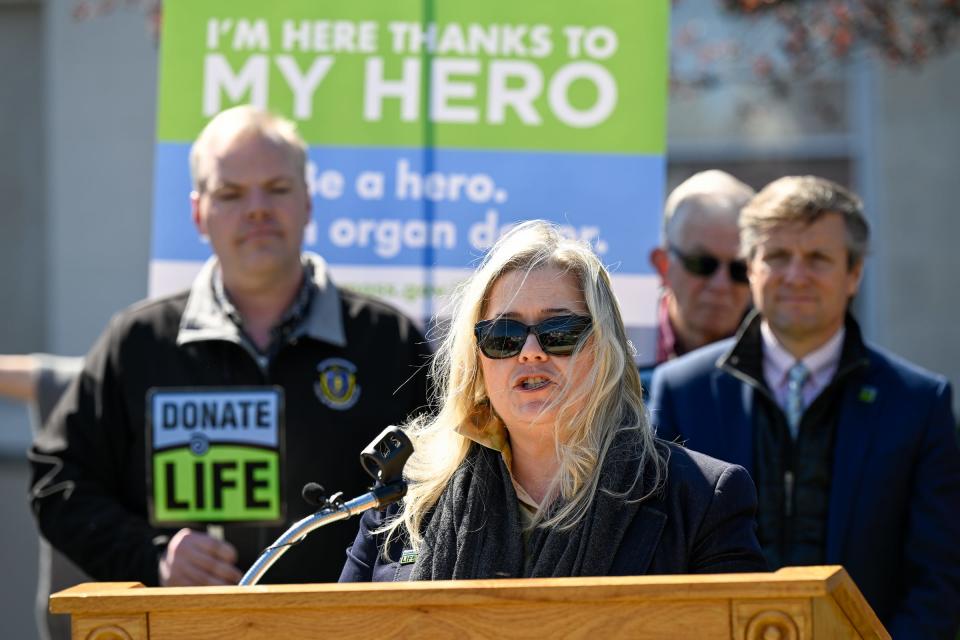'Safe.' Mass. urges more undocumented residents to secure driver's licenses under new law
With the Work and Family Mobility Act nearing six months as law, officials from the state Department of Transportation and Registry of Motor Vehicles said the rollout was smooth and successful, but the agencies want to reach many more residents.
The law, implemented in July, permits eligible residents to obtain a standard driver’s license regardless of immigration status, including learner’s permits and Class D or M driver’s licenses.
In a Dec. 15 interview with the Times, Registrar of Motor Vehicles Colleen Ogilvie said the process is “safe” for undocumented residents to go through, that their data will not be handed over to immigration authorities.
“We believe there are additional individuals (who) are eligible for this driver's license,” Ogilvie said. “And while we had a massive push with the implementation of the law and a lot of information sharing over the summer about how to access and navigate registry services, we want to ensure people understand that that opportunity is still available.”
Law and stats
Since the law was passed, the RMV has issued over 91,961 learner's permits and 54,952 driver’s licenses, Ogilvie said. She said the law has been instrumental in allowing residents without lawful presence in the U.S. to participate more fully in society.

“We have a lot of immigrants that live in this state, and they have families and lives and jobs like all of us do,” Ogilvie said. “This enables them to get to doctor's appointments, do their grocery shopping, visit family and friends, and gives them a sense of independence that they may not have experienced prior to this law.”
The number of people who have received proper driving documentation since last year has increased 227%, Ogilvie said.
Measure means increased safety on Bay State roads
Public safety was a key factor in pushing for the law, she said. The idea being, the more residents who go through the proper channels, the safer said roads would be.
Currently, 19 other states, including Connecticut and Rhode Island, offer similar measures for undocumented residents — such as Connecticut and Rhode Island — and officials have said there has been a decrease in the number of traffic accidents and hit-and-run incidents since their implementation.
“If you're not an English proficient speaker or reader, then you have the ability to take the permit test in a language that's most comfortable for you to make sure you understand and learn the rules of the road in Massachusetts,” Ogilvie said. “And then followed by a road test where we test your skills and abilities to operate a vehicle safely in Massachusetts.”
Data sharing concerns
When the law was initially passed, advocates and the immigrant community worried about the data being handed over to federal immigration authorities like U.S. Immigrations and Customs Enforcement. Despite concerns, there were several efforts to dispel such anxieties through the language of the legislation and community engagement.
“We built into the law, as many protections as we could to ensure that information didn’t go to ICE,” said Laura Rotolo, field director for the American Civil Liberties Union Massachusetts.
The ACLU has been working with the office of Massachusetts Attorney General Andrea Campbell to draft tightened regulations to hedge against sharing participating residents' data with immigration authorities, Rotolo said.
“We are hoping that they will continue to provide robust protections, so that the data is not misused for deportation,” she said. “We have not seen any issues since the law took effect, and we have not heard from anybody that their information is being shared with ICE.”
Where are RMVs on the Cape and Islands?
Registry of Motor Vehicles offices on the Cape and Islands are 16 Broad St. on Nantucket; 11 A St. in Edgartown on Martha's Vineyard and 1068 Route 28 in South Yarmouth.
The documents required are proof of date of birth, proof of residency in Massachusetts, and a Social Security number.
There is a process for those who don't have a Social Security number. An individual can sign an affidavit with an RMV employee present stating they never had a Social Security number.
“We also want to highlight that there are bad actors out there,” Ogilvie said. “There are still people that are trying to take advantage of individuals that are new to government processes that are new Massachusetts.”
She said the RMV only charges for a permit test, a road test and the issuance of a driver's license, totaling $115. They do not charge for an interpreter or for or making an appointment, Ogilvie said.
Walker Armstrong reports on all things Cape and Islands, primarily focusing on courts, transportation and the Joint Base Cape Cod military base. Contact him at WArmstrong@capecodonline.com. Follow him on Twitter:@jd__walker.
Thanks to our subscribers, who help make this coverage possible. If you are not a subscriber, please consider supporting quality local journalism with a Cape Cod Times subscription. Here are our subscription plans.
This article originally appeared on Cape Cod Times: Six months later: A look at the Work and Family Mobility Act

